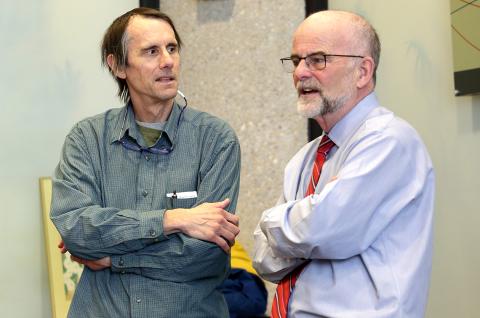How Exercise, Fewer Calories, Plant Toxins May Protect Our Brains

Photo: Ernie Branson
Outside of the lab, neuroscientist Dr. Mark Mattson loves to go running. In fact, NIH’ers may have seen him and his Baltimore-based lab mates compete in the annual NIH Institute Relay on campus, where they have placed in the top 3 of about 100 teams for the past 3 years.
In the lab, Mattson and his colleagues are racing to uncover the potential of exercise, fasting and consuming certain plant chemicals to improve brain function and thwart neurodegenerative disease.
“These energetic challenges—[fasting and exercise]—enhance synaptic plasticity, protect neurons during aging and maybe protect against neurodegenerative disorders,” said Mattson, chief of NIA’s Laboratory of Neurosciences. He spoke at a Jan. 6 seminar titled, “What Doesn’t Kill You…Why Some Plant ‘Toxins’ May Bolster Brain Health.”
Exercise, Fasting May Improve Brain Function
As modern medicine helps more people live longer, more men and women are in danger of neurodegenerative disorders such as Alzheimer’s and Parkinson’s diseases, for which there’s still no effective treatment. But do lifestyle habits affect brain health? They very well might.
As we age, brain cells endure oxidative damage and local inflammation that can compromise synapse function and cause degeneration. Mattson’s research has shown that exercise and intermittent fasting can activate adaptive stress response pathways and may promote optimal function of cells.

Photo: Ernie Branson
“There’s evidence, mostly from animal models but also from an increasing number of epidemiological studies, to suggest that these changes that occur in the brain during aging, and are exacerbated in Alzheimer’s and Parkinson’s diseases, can be attenuated or counteracted by certain dietary and lifestyle [choices],” said Mattson.
In studies, sedentary mice exhibited much less brain activity than mice using a running wheel. Furthermore, when taught to touch icons on a computer screen for food rewards, Mattson said, the runner mice made fewer errors than did the sedentary ones, showing a correlation to the number of new neurons generated in the brain.
Mattson has observed healthy changes in people, too. While coaching his kids in cross-country, he said they concentrate better and are more cheerful during the running season. His lab studies routinely show that exercise improves cognitive function and can enhance DNA repair. People who exercise throughout their lives, he said, are less likely to develop dementia.
Meanwhile, intermittent fasting studies on animals and people, he said, show improved glucose regulation and lipid profile and activated adaptive stress response pathways in cells. His lab found that mice fasting on alternate days before given a neurotoxin that damages the same neurons affected in Alzheimer’s had less learning and memory deficits. In stroke models, they also found less brain damage. In a Huntington’s disease model, intermittent fasting before the mice were symptomatic also delayed onset of motor dysfunction and protected neurons.
As our brains process information, neurons are active and levels of BDNF (brain-derived neurotrophic factor, a protein that helps protect neurons) increase. Mattson’s lab found that exercise and fasting can increase production of BDNF.

Photo: Ernie Branson
If the hippocampus, the brain region critical for learning and memory, doesn’t function optimally, short-term memory gets lost—a main symptom of Alzheimer’s—and nerve cells degenerate.
“So not only does exercise and intermittent fasting strengthen existing synapses,” said Mattson, “we think it promotes an increased number of neurons and formation of new circuits in the hippocampus.”
Some neurological pathways affected by exercise and fasting are also affected by phytochemicals (plant compounds), which may protect cells against injury and disease, said Mattson.
Everything in Moderation
In contrast to animals, plants cannot run away from potential predators such as insects and the ever present grazing deer. Instead, to protect themselves from such predators, plants produce natural pesticides, bitter-tasting chemicals that act as a natural deterrent.
“There is emerging evidence that at least some of the chemicals in fruits, vegetables and other plants we eat, from an evolutionary perspective, their function is to dissuade insects and other organisms such as us from eating them,” said Mattson. But, over time, he said, animals and people have adapted to protect themselves from the potential toxic effects of these chemicals.
While some of these phytochemicals could be toxic, even lethal, at high doses, studies show many have health benefits when consumed in smaller amounts—a process called hormesis. Some of these chemicals upregulate our adaptive stress response and inhibit inflammation—which is important in Alzheimer’s and Parkinson’s research, said Mattson. Other phytochemicals can modulate pathways involved in energy metabolism and neurotrophic signaling.

Photo: Ernie Branson
Mattson’s lab recently tested 50 plant chemicals for their “hormetic” effects. One such chemical, plumbagin, reduced brain damage in mice pretreated with it before they had a stroke. Other labs have found that quercetin, found in rhododendron and other plants and available in health food stores, protected cognitive function in Alzheimer’s and stroke models in mice and rats. Another compound, geraniin, also found in rhododendron, exhibited neuroprotective qualities and suppressed DNA damage relevant to Alzheimer’s, in certain doses. Other phytochemicals with restorative properties include galantamine, curcumin and capsaicin.
“From a lifelong health perspective, it’s important to challenge yourselves and your organ systems intermittently with things like exercise, not overeating, maybe even fasting a little bit. Maybe skip breakfast or lunch, then exercise, then eat,” said Mattson. “This is a mild stress on cells and cells respond adaptively by upregulating stress resistance pathways and autophagy [a sort of cellular garbage disposal system].”
But be sure to rest after vigorous exercise or moderate, intermittent fasting. “You don’t want to subject yourself to stress for an extended time period,” he said. Important processes take place during recovery, including protein synthesis and the formation of synapses. Mattson continues to test the theory that the cycles of challenge and recovery might promote optimal health.
So, the next time you’re out jogging or reducing your caloric intake or consuming a phytochemical, you just might be maintaining cellular health and starting a habit that may promote optimal brain health into a ripe, old age.
